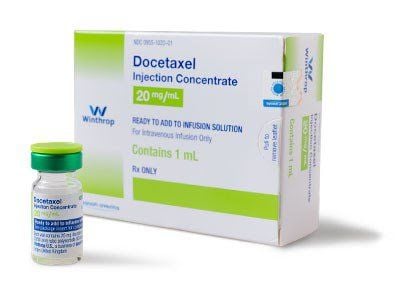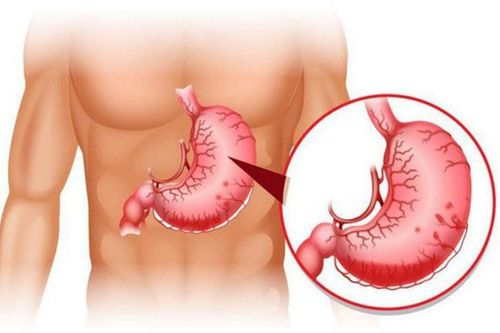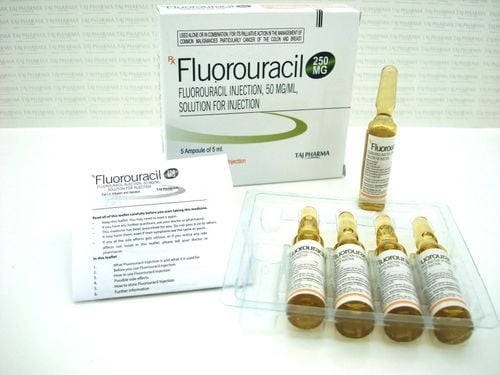This is an automatically translated article.
Posted by Dr. Do Minh Hung - Head of General Surgery Department, Vinmec Central Park International General Hospital.Stomach cancer is the fourth malignancy and the second leading cause of cancer death because it is difficult to diagnose at an early stage. H. pylori infection is a common cause of the disease. In Vietnam, stomach cancer ranks third and the cancer incidence is getting younger and younger.
1. What is the stomach?
The stomach is a hollow organ that connects the esophagus to the duodenum (the first part of the small intestine). The stomach is located in the upper left side of the abdomen, receiving food from the esophagus through the lower esophageal sphincter.The stomach secretes acids and enzymes that digest food. The stomachs contract in waves, kneading the food to enhance digestion. The pyloric sphincter is a muscular valve that opens to allow food pellets to pass from the stomach into the small intestine.
2. What is stomach cancer?
Stomach cancer is characterized by proliferation of cancer cells in the lining of the stomach wall and then invasion deeper into the stomach wall as the disease progresses.Stomach cancer tends to grow slowly over many years. Before cancer actually develops, precancerous changes often occur in the lining of the stomach. Early changes rarely cause symptoms and are therefore often undetected.
3. What is the rate of stomach cancer?
The American Cancer Society estimates for stomach cancer in 2015 are:Approximately 24,590 cases of stomach cancer will be diagnosed (15,540 in men and 9,050 in women) About 10,720 people will die from this cancer (6,500 men and 4,220 women) Stomach cancer mainly affects older people. The average age of people with the disease when they are diagnosed is 69. About 6 out of 10 people diagnosed with stomach cancer each year are 65 or older. The average risk that a person will develop stomach cancer during their lifetime is about 1 in 111. This risk is higher in men than in women and can also be influenced by a number of other factors. The age of the disease is getting younger and younger.
Stomach cancer is uncommon in the United States, and the number of people diagnosed with it each year is decreasing. Stomach cancer is more common in other parts of the world, especially China and Japan. It is the leading cause of cancer death in the world.
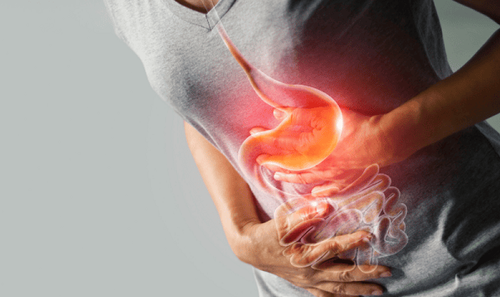
Ung thư dạ dày chủ yếu ảnh hưởng đến người lớn tuổi
4. What are the symptoms of stomach cancer?
Stomach cancer symptoms include:Nausea and vomiting Difficulty swallowing Feeling full after eating some food Severe and persistent heartburn Severe indigestion that doesn't stop Loss of appetite Weight loss Feeling tired Bloating After eating Vomiting blood (in advanced stages of cancer)
5. What is the cause of stomach cancer?
Doctors aren't sure what causes stomach cancer. There is a strong link between eating smoked, salted and pickled foods (vinegar) and stomach cancer. Since the introduction of frozen food preservation worldwide, the incidence of stomach cancer has decreased.The main cause of stomach cancer is a gene mutation in the cells of the stomach that causes the cells to grow rapidly and eventually form a tumor.
Types of stomach cancer:
adenocarcinoma. About 90% to 95% of gastric cancers are adenocarcinomas. When it comes to stomach cancer almost always refers to adenocarcinoma. Lymphoma. These are cancers of the immune system tissue that are sometimes found in the wall of the stomach. About 4% of stomach cancers are lymphomas. . Gastrointestinal stromal tumor (GIST). These are rare tumors. Some of these tumors are not cancerous (benign); some are cancerous. Although GISTs can be found anywhere in the gastrointestinal tract, most are detected in the stomach. Carcinoids. These are tumors that form from the hormone cells of the stomach. Most tumors do not spread to other organs. About 3% of stomach cancers are carcinoid tumors. Other types. Other types such as squamous cell cancer, small cell cancer, and leiomyosarcoma can also start in the stomach but are rare.
6. What are the risk factors for stomach cancer?
Factors that increase the risk of stomach cancer include:Helicobacter pylori infection A diet salty and smoked A diet low in fruits and vegetables Eating foods contaminated with aflatoxin fungi Family history of the disease Stomach cancer Chronic gastritis Pernicious anemia Smoking, drinking Stomach polyps Sedentary, obese

Hút thuốc, uống rượu là yếu tố làm tăng nguy cơ ung thư dạ dày
7. How is stomach cancer diagnosed?
There are a few different tests used to help diagnose stomach cancer:Imaging tests such as CT scan, contrast-enhanced gastric X-ray, and MRI can help identify the disease when the tumor is large enough.
Upper GI endoscopy is necessary for biopsy of the lesion to confirm the diagnosis or to detect cancer early before the tumor is large enough to be seen on imaging tests.
To determine how far the tumor has invaded the stomach wall and to assess the stage of the cancer, your doctor will order an endoscopic ultrasound.
8. At what stage do I have cancer?
Stomach cancer can invade (metastasize) in different ways. It can grow through the stomach wall and invade nearby organs. It can also spread to the lymphatic vessels and nearby lymph nodes. As stomach cancer progresses, it can enter the bloodstream and spread to organs such as the liver, lungs, and bones.The stage of your stomach cancer will help your doctor decide which treatment is right for you. Tests and procedures used to stage cancer include:
Imaging assessments: CT and PET Laparoscopy. Laparoscopic surgery allows your doctor to look for signs of invasive cancer in your abdomen. Other tests may be used depending on the patient's condition. From the data above, your doctor will determine the stage of your stomach cancer. The stages of stomach cancer can be Stage I, II, III or IV.
9. How is stomach cancer treated?
Cancers that start in different parts of the stomach can cause different symptoms and have different outcomes. Treatment options for stomach cancer depend on the stage of the cancer, your general condition, the location of the tumor, and your preferences.Surgery : Surgery can be done laparoscopically, laparoscopically or open surgery. The goal of surgery is to remove all of the stomach cancer tissue and have a healthy margin (no cancer cells left), including:
Gastric mucosal resection for early-stage cancers: Resection mucosa, submucosal cut through flexible endoscope. Partial gastrectomy: Removal of the part affected by stomach cancer. Total gastrectomy: Removal of the entire stomach and some surrounding tissue. Lymph node dissection to look for cancer: The surgeon dredges the lymph nodes that drain the stomach. Surgical resection: Removal of part of the stomach that carries an advanced tumor. In this case, surgery cannot cure the disease but can make the person more comfortable. Radiation therapy: Radiation therapy may be given before surgery to shrink stomach tumors so they can be easily removed. Radiation therapy can also be given after surgery to kill cancer cells that are still around the stomach. Radiation therapy is often combined with chemotherapy. In advanced cases of cancer, radiation therapy may be used to relieve side effects caused by a large tumor. Radiation therapy can cause diarrhea, indigestion, nausea, and vomiting.
Chemotherapy: Chemotherapy may be given before surgery to help shrink a tumor so that it can be easily removed. Chemotherapy is also used after surgery to destroy any cancer cells that are still in the body. Chemotherapy is often combined with radiation therapy. Chemotherapy may be used alone in people with advanced stomach cancer to help relieve signs and symptoms.
Side effects of chemotherapy depend on the drug used.
Targeted drugs: Targeted therapy uses drugs to kill specific abnormalities in cancer cells.
Clinical trials.
10. How to prevent stomach cancer?

Tập thể dục thường xuyên để phòng ngừa ung thư dạ dày
Eat lots of fruits and vegetables. Choose a variety of colorful fruits and vegetables. Reduce the amount of salty and smoked foods. Quit smoking. If you smoke, quit. If you don't smoke, don't start smoking. Smoking increases the risk of stomach cancer, as do many other types of cancer. Maintain a healthy weight and get into an exercise routine.
11. Can stomach cancer be detected early?
In countries like Japan, where stomach cancer is very common, widespread screening in the population has helped detect many cancers at an early stage that can be cured. This may reduce the number of people dying from the disease but this has not been proven.Some tests may be used to screen for stomach cancer, such as an upper gastrointestinal endoscopy.
Scientists believe that people with risk factors may benefit from stomach cancer screening. Ask your doctor about your risk of stomach cancer. Talk to your doctor if you are at high risk for stomach cancer.
12. What is the outlook for people with stomach cancer?
The prognosis for stomach cancer can vary widely depending on the stage of the cancer. Patients with early stage have a much better survival rate than late stage cancer. If stomach cancer is found at an early stage it can be removed endoscopically, the 5-year survival rate is more than 90%. If cancer is detected after it has spread to areas around the stomach, the 5-year survival rate is 28%. If the cancer has spread further than the area around the stomach, the five-year survival rate is 4%.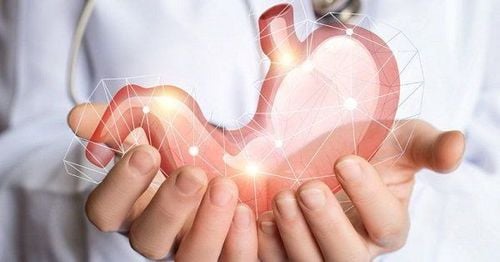
Tiên lượng bệnh ung thư dạ dày có thể rất khác nhau tùy thuộc vào giai đoạn của ung thư
13. Stomach cancer removal surgery at Vinmec Central Park International Hospital
At Vinmec Central Park International General Hospital (HCMC), a new technique is applied – Robotic surgery with a hand-held robot to treat stomach cancer. This method is having many advantages compared to both classic laparoscopic surgery and robotic surgery with:Instruments with surgical heads act as flexibly as wrist joints to help access narrow angles, increasing the possibility of dissection and less damage to the surrounding area compared with classical laparoscopic surgery; Automated endoscopes via voice, laser, eye tracking, ... help doctors actively control and have better vision and control, increasing accuracy and safety in performing surgery ; With the advantages of compactness, robotic arm surgery is less invasive and has many advantages such as small incisions, less pain, low risk of infection, thereby helping customers to lose less blood during surgery and recover quickly; The cost is much lower than robotic surgery. >>>> Customers can refer to information: Day surgery, outpatient surgery
Patients will be consulted and treated with experienced endoscopic doctors and directly operated by Dr. Do Minh Hung - Head of General Surgery - Vinmec Central Park General Hospital. Dr. Hung has more than 25 years of experience in the field of General Surgery and has carried out dozens of valuable scientific research works, published many unique surgical techniques, bringing positive treatment effects.
To register for examination and treatment at Vinmec Central Park International General Hospital, please contact Hotline: 0283 6221 166 or register online HERE.
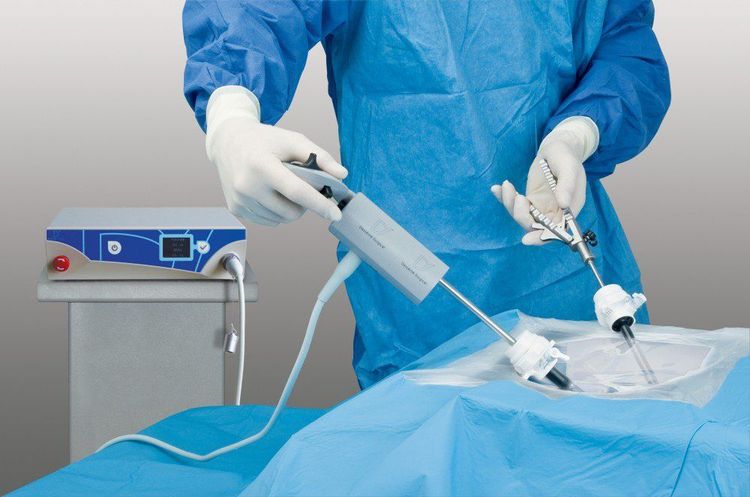
Phẫu thuật ít xâm hại bằng robot cần tay (robotic surgery)






